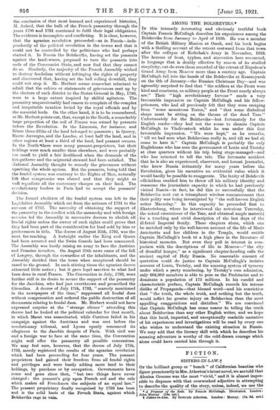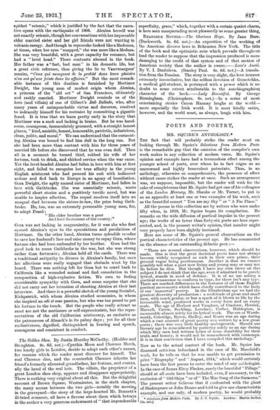FICTION.
SISTERS-IN-LAWat OF the brilliant group or " bunch " of Californian beauties who figure prominently in Mrs. Atherton's latest novel, we are told that Alexina Groome was the most "vivid," and it is almost impos- sible to dispense with that overworked adjective in attempting to describe the quality of the story, unless, indeed, we use the
• A Prieoner of the Redo. By Francis McCullagh. Illustrated. London: John Murray. [18s. net.] thsgers-in-Law. By Gertrude Atherton. London : Murray. Rs. ad. epithet "seismic," which is justified by the fact that the narra- tive opens with the earthquake of 1906. Alexina herself was not exactly seismic, though her conversations with her impeccable elder married sister and her girl friends were not wanting in volcanic energy. And though in reposeshe looked like a Madonna, at times, when her eyes "snapped," she was more like a Medusa. She was very beautiful, with a great capacity for romance, but had a " level head." These contrasts abound in the book. Her father was a " fast, bad man" in his domestic life, but a great civic reformer, thus giving the lie to Vauvenargues' maxim, "Getax qui menquent de is probite dens leans p/aiairs n'en ont qu'une feints dans les affaires." But the most remark- able instance of this dualism is furnished by Mortimer Dwight, the young man of modest origin whom Alexina,. a princess of the " old set " of San Francisco, ultimately and rashly married. Mortimer Dwight reminds us of the hero (and villain) of one of Gilbert's Bab Ballads, who, after many years of unimpeachable virtue and decorum, resolved to indemnify himself for his restraint by committing a gigantic fraud. It is true that we learn pretty early in the story that Mortimer was a snob and larking in brains. But he was hand- some, courageous, immaculately groomed, with a straight honest glance, " kind, amiable, honest, honourable, patriotic, industrious, clean, polite, and moral." We can understand that the coruscat- ing Alexina was bound to find him dull in the long run. But she had been more than content with him for three years of married life before she discovered that he was even dull. Then all in a moment he turned thief, robbed his wife of her fortune, took to drink, and shirked service when the war came. Yet the level-headed Alexina had fallen in love with him at first sight, and failed to recognize her true affinity in the young English aristocrat who had pressed his suit with indiscreet ardour and fled back to Europe in an agony of humiliation. Gora Dwight, the aptly named sister of Mortimer, had fallen in love with Gathbroke. She was essentially seismic, wrote powerful short stories and a positively terrific novel, but was unable to inspire affection. The sequel resolves itself into an unequal duel between the sisters-in-law, the prize being Gath- broke. He, too, was an extremely personable young man, for, to adapt Praed:
" His older brother was a peer And lord-lieutenant of the county."
Gora was not lacking in magnanimity, for it was she who first opened Alexina's eyes to the speculations and peculations of Mortimer. On the other hand, Alexina turns aplendide mssulax to save her husband's face and raise money to repay Gora, whose fortune also had been embezzled by her brother. Gera had the good luck to nurse Gathbroke in the war, but she was strong rather than fortunate ; Alexina held all the cards. There was a traditional antipathy to divorce in Alexina's family, but once her affections were really engaged that obstacle went by the board. There was nothing left for Gora but to crawl back to California like a wounded animal and find consolation in the composition of high-explosive fiction. We own to feeling considerable sympathy with Gera, and some surprise that she did not carry out her intention of shooting Alexina at their last interview. And there is a powerful sketch of the young Socialist, Kirkpatrick, with whom Alexina studied economics, in whom she inspired an odi et amo passion, but who was too proud to put his fortune to the touch. But the people who really attract us most are not the mutineers or self-expressioniatai, but the repre- sentatives of the old Californian aristocracy, as exclusive as the patronesses of Almack's in its palmy days ; yet for all their exclusiveness, dignified, distinguished in bearing and speech, courageous and consistent in conduct.



































 Previous page
Previous page